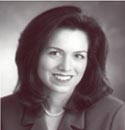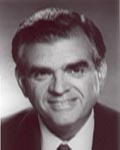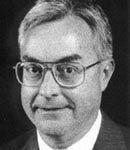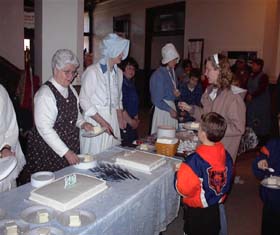

|
Local History, Story Times Make Library Special [FEB. 15, 2000] L incoln folks like their library. In the recent Capstone Project survey, the Lincoln Public Library received a vote of confidence. The survey asked respondents to indicate which areas of life in Lincoln they were concerned about and which areas they found satisfactory. The library was one of those they liked the best. In fact, 95% of those surveyed agreed that the Lincoln Public Library is tops.
|
|
|
Along with the books, magazines, newspapers, videotapes, computers, meeting rooms and photocopiers which are common to most libraries, Lincoln’s library offers some services that many others its size do not have, according to Library Director Richard M. Sumrall. He points with pride to the local history collection. "We try to provide anything that will aid researchers looking for local history or genealogy. There is a tremendous interest now in both those areas." The collection includes census records, cemetery records, family histories, manuscripts, telephone books and old newspapers from Lincoln and from the smaller communities in Logan County, according to research librarian Caroline Kiest. The newspapers, stored on microfilm, date back to 1859 and include the "Lincoln Herald" and "Lincoln News-Herald," the "Lincoln Times," the "Lincoln Journal," the "Star," and "The Courier," along with former Atlanta, Middletown and Mount Pulaski newspapers. Even the "Lincoln Volksblatt," a German-language newspaper published from 1877 to 1898, is included.
More historical information is stored on CD-ROMs. These computer disks list marriage records in most states of the Union, some going back as far as 1641, as well as land records, Social Security death indexes, census records, and collections of genealogy books. "Using these CDs, people can come in, type in a surname, and do a national search," Sumrall explained. "In the summer, almost every day a couple from somewhere else comes in looking for their relatives. Many people don’t know this area was a gateway for settlers who were heading West. For example, in 1846 the Donner Party started for California from Springfield, Ill." (The Donner Party became trapped in the Sierra Nevada Mountains by heavy snow, and some members resorted to cannibalism to survive.)
|
"What makes us special is that we are really committed to public service," Sumrall continued. "Whenever someone comes in with a query, no matter how difficult it may seem, we want to give that person some kind of information. We never want to utter the words, ‘We can’t help you answer that question.’" Service is also the emphasis in the Annex, the library addition, which houses the adult fiction and the children’s department. Pat Schlough, the youth services librarian, wants it to be "a comfortable, attractive place where children want to come." When the Annex opened in March of 1995, the children’s library was able to move from the basement of the main building to its present spacious quarters. It houses more than 12,000 children’s books, along with four computers, a craft room and a guinea pig, Wilbur, named for the pig in the classic children’s book "Charlotte’s Web." "Parents and children like our story times," Schlough said. "Story time encourages them to be readers. Once children listen to us read to them, they begin to want to take the book home and read it themselves. If they enjoy a certain book they know how to go to the shelf and find others like it." During the school year, story hours for children ages 3-5 are Monday and Tuesday at 10 a.m. and Monday evening at 6 p.m. A story program for kindergartners is held on Tuesday at 2:15 p.m. In the spring and fall, 50 to 60 children sign up for story time. In the summer, with five story hours scheduled, about a hundred children attend, Schlough said. Craft time for children in grades one through six is held from 3:30 p.m. to 4:30 p.m. on Thursdays. In addition, an after school tutorial program, staffed by volunteers Monday through Thursday, offers children help with homework and studying. The children’s library also has copies of all textbooks used in grades one through eight in school District 27, so children who forget their books can come in and catch up on their homework. Each week the library is open until 8 p.m. Monday through Thursday, until 6 p.m. on Fridays, and until 3 p.m. on Saturday.
[Pam Sheley and Richard Sumrall] |
|
Lincoln College Marks 135th Anniversary [FEB. 14, 2000] Lincoln College celebrated 135 years of existence at Charter Day observances Sunday, Feb. 13. The granting of the school's charter was marked by speeches and by giving special recognition to honored alumni and public figures. President Jack Nutt presided over the ceremonies in the Johnston Center on the Lincoln College campus. He reminded the audience of the college's commitment in 1865 to its namesake, President Abraham Lincoln, "to do justice to your name." Several speakers expressed their belief that the college's promise had been fulfilled. |
|
|
The 2 p.m. observance featured the academic procession of administrators, trustees, honorees and faculty. Faculty marshals leading the procession were Dr. Howard Anderson and Professor David Schroder, student marshals were Joshua Day and Lacey Middlecoff. Musical selections were provided by Professor Bill Buffington and the Lincoln College Express, accompanied by Ann Doolen. Keynote speaker was Dr. Barbara Burkhardt, professor of English at the University of Illinois, Springfield. She spoke about her research into the life and literary works of William Maxwell, a respected author and editor of The New Yorker magazine, whose stories reflect his upbringing in Lincoln, Illinois, early in the twentieth century. She noted his influence in the careers of such luminaries as John Cheever and John Updike and traced his "empathy and wisdom," as well as his "humanity and quiet strength," to his years in Lincoln. Though much of his life's work and residence have been in New York City, Lincoln was his "imagination's home," according to Burkhardt. Burkhardt was awarded an honorary doctorate of humane letters following her speech.
[Burkhardt] [Ginzel]
Among others awarded honorary doctorates were artists Roland Ginzel and his wife Ellen Lanyon. Both Ginzel and Lanyon are internationally famous artists whose works are widely exhibited. Ginzel took art classes at Lincoln College as a child and later was a college student on campus. U.S. Rep. Ray LaHood was also awarded a degree for his public service. LaHood represents the 18th District in Illinois, a district with a rich legacy of leadership, for the district has been represented by Abraham Lincoln, Everett Dirksen, Ed Madigan of Lincoln, and Bob Michael. LaHood announced that plans are moving ahead for the Lincoln Presidential museum in Springfield and that he had sponsored legislation establishing a commission to plan the observance of the 200th anniversary of President Lincoln's birth.
[LaHood] [Lanyon]
|
Also presented with honorary degrees were Charles T. Cullen, computer archivist and editor of Thomas Jefferson's papers; Norman Hellmers, superintendent of the Abraham Lincoln home site; and Marion Smoak, former Chief of Protocol for the U.S. State Department during the Nixon presidency. Smoak shared several amusing and touching stories about international dignitaries he helped host during his government service. Smoak, whose wife attended Lincoln College, urged neighbors and constituents to "never overlook the jewel" they have in Lincoln College.
[Cullen]
[Hellmers] [Smoak]
The Charter Day observance of Lincoln College's past establishes a rich foundation for a bright future. This anniversary comes at a time of rapid growth in student enrollment and development of the campus facilities. The Lincoln City Council recently approved a $5 million bond issue for building new dorm facilities, a new classroom and office building, an addition to the Johnston performing arts center, and a new maintenance building for the Lincoln campus.
[Barbara Burkhardt]
|
|
Happy
Birthday Abe! [FEB. 12, 2000] “He freed the slaves,” is how Josh Kastendick, a second grader in Sara McCormick’s class at Zion Lutheran, remembers Abraham Lincoln. Like schools throughout the county, Zion Lutheran reaches a high pitch of activity each year at this time. |
|
|
On Friday night, the eve of Lincoln’s birthday, his Grand Old Party gathered at the Lincoln Knights of Columbus Hall to hear from Joseph Hampton Jr., Director of the Illinois Department of Agriculture. The event was emceed by Eric Robinson; Representative John Turner led the assembly in the pledge of allegiance and offered the invocation; and Senator Bob Madigan introduced the guest speaker. Congressman Ray LaHood made a brief appearance as well.
[Zion Lutheran second graders proudly display Abe Lincoln banks]
Today (Saturday), the City of Lincoln celebrated with
activities beginning at 9:30 a.m. at the Logan County
Courthouse. Paul
Gleason, a noted Logan County historian, spoke on
Lincoln's boyhood. Mayor Joan Ritter made remarks, a
wreath was presented in honor of Lincoln, and the
Interveteran's Council of Lincoln contributed a 21-gun
salute and taps.
|
Tomorrow (Sunday), Lincoln College, the only college named
for Abraham Lincoln during his lifetime, will hold its 135th
anniversary celebration. The celebration will be held at Johnston Center for the
Performing Arts and is open to the public.
A reception will immediately follow in the
Meyer-Evans Student Center.
Lincoln College will bestow honorary degrees upon
Barbara Burkhardt, A William Maxwell scholar; Charles
Cullen, Librarian and President of the Newberry Library in
Chicago; artist, Roland Ginzel; Congressman Ray LaHood;
Norman Hellmers, Superintendent of the Lincoln Home
National Historic Site; Marion Smoak, retired Ambassador
of the United States; and artist Ellen Lanyon.
[Serving Abe's birthday party cake.] |
|
Local Lincoln impersonator dies [FEB. 11, 2000] Most people knew Harry Hahn by one name. A name that was in fact not his own. Children, teen-agers, parents and grandparents alike would holler "Abe" from near and far when Hahn was around. They found a connection with him because of his connection to this community. |
|
|
Hahn, who died yesterday, was a living legend. His tall, slender frame, donned in a crisp, black three-piece suit, complete with starched white shirt, black bow tie, stovepipe hat and a perfectly-trimmed rich black beard, presented an uncanny impression of America’s 16th President, Abraham Lincoln. Lincoln himself would have been 191 years old tomorrow. Local historian, Paul Beaver, reminisces about how he met Hahn while they were in high school. "He was on a good high school basketball team in 1951. They would have gone to state except they were beaten by Lincoln."
|
"He’s a fine guy," Beaver states. "I doubt you could ever find a guy who looks any more like Lincoln than he did. He was the perfect height, with the same craggy features and dark coarse hair. He and Charlie Ott (another local Lincoln impressionist) have done so much good for so many people." While Ott, who has also known Hahn through playing high school basketball in the '50s, says he didn’t know Hahn on a personal level, they were acquainted professionally because of their common interest in Abraham Lincoln. "We spoke when we saw each other," Ott said. Hahn, known for passing out pennies to school children, telling them that it was his picture, brought American history to life with his presentations about the life of Lincoln. Not a detail was missed from Lincoln’s birth in Hodgenville, Ky., to Lincoln’s move to Washington, D.C. when he become President of the United States. According to Hahn’s own literature, he traveled throughout the U.S. portraying Lincoln. He even appeared on the Today Show and PM Magazine. In addition, he appeared in the Associated Press book Moments in Time. He was also the winner of the 1981 Lincoln Look-a-like contest in Springfield and the 1982 Hodgenville, Ky., Lincoln Look-a-like contest. For complete obituary information, click here.
|
















